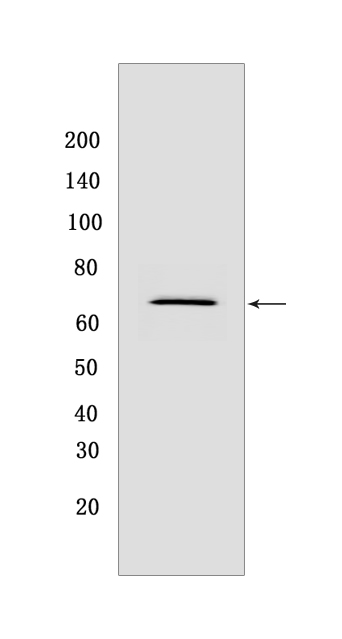KU70,XRCC6 Mouse mAb[4TWB]Cat NO.: A52027
Western blot(SDS PAGE) analysis of extracts from HEK-293 cells.Using KU70,XRCC6 Mouse mAb IgG [4TWB] at dilution of 1:1000 incubated at 4℃ over night.
Product information
Protein names :XRCC6,G22P1,XRCC6_HUMAN,X-ray repair cross-complementing protein 6
UniProtID :P12956
MASS(da) :69,843
MW(kDa) :70kDa
Form :Liquid
Purification :Protein A purification
Host :Mouse
Isotype :IgG
sensitivity :Endogenous
Reactivity :Human,Mouse,Rat
- ApplicationDilution
- 免疫印迹(WB)1:1000-2000
- 免疫组化(IHC)1:100
- 免疫荧光(ICC/IF) 1:100,
- The optimal dilutions should be determined by the end user
Specificity :Antibody is produced by immunizing animals with a synthetic peptide of human KU70,XRCC6.
Storage :Antibody store in 10 mM PBS, 0.5mg/ml BSA, 50% glycerol. Shipped at 4°C. Store at-20°C or -80°C. Products are valid for one natural year of receipt.Avoid repeated freeze / thaw cycles.
WB Positive detected :HEK-293 cells
Function : Single-stranded DNA-dependent ATP-dependent helicase that plays a key role in DNA non-homologous end joining (NHEJ) by recruiting DNA-PK to DNA (PubMed:7957065, PubMed:8621488, PubMed:12145306, PubMed:11493912, PubMed:20493174, PubMed:2466842, PubMed:9742108). Required for double-strand break repair and V(D)J recombination (PubMed:7957065, PubMed:8621488, PubMed:12145306, PubMed:11493912, PubMed:20493174, PubMed:2466842, PubMed:9742108). Also has a role in chromosome translocation (PubMed:7957065, PubMed:8621488, PubMed:12145306, PubMed:11493912, PubMed:20493174, PubMed:2466842, PubMed:9742108). Has a role in chromosome translocation (PubMed:7957065, PubMed:20493174, PubMed:2466842, PubMed:9742108, PubMed:8621488, PubMed:12145306, PubMed:11493912). The DNA helicase II complex binds preferentially to fork-like ends of double-stranded DNA in a cell cycle-dependent manner (PubMed:7957065, PubMed:8621488, PubMed:20493174, PubMed:2466842, PubMed:9742108, PubMed:12145306, PubMed:11493912). It works in the 3'-5' direction (PubMed:20493174, PubMed:2466842, PubMed:9742108, PubMed:7957065, PubMed:8621488, PubMed:12145306, PubMed:11493912). During NHEJ, the XRCC5-XRRC6 dimer performs the recognition step: it recognizes and binds to the broken ends of the DNA and protects them from further resection (PubMed:7957065, PubMed:8621488, PubMed:20493174, PubMed:2466842, PubMed:9742108, PubMed:12145306, PubMed:11493912). Binding to DNA may be mediated by XRCC6 (PubMed:20493174, PubMed:2466842, PubMed:9742108, PubMed:7957065, PubMed:8621488, PubMed:12145306, PubMed:11493912). The XRCC5-XRRC6 dimer acts as regulatory subunit of the DNA-dependent protein kinase complex DNA-PK by increasing the affinity of the catalytic subunit PRKDC to DNA by 100-fold (PubMed:7957065, PubMed:8621488, PubMed:12145306, PubMed:11493912, PubMed:20493174, PubMed:2466842, PubMed:9742108). The XRCC5-XRRC6 dimer is probably involved in stabilizing broken DNA ends and bringing them together (PubMed:7957065, PubMed:8621488, PubMed:12145306, PubMed:11493912, PubMed:20493174, PubMed:2466842, PubMed:9742108). The assembly of the DNA-PK complex to DNA ends is required for the NHEJ ligation step (PubMed:7957065, PubMed:8621488, PubMed:12145306, PubMed:11493912, PubMed:20493174, PubMed:2466842, PubMed:9742108). Probably also acts as a 5'-deoxyribose-5-phosphate lyase (5'-dRP lyase), by catalyzing the beta-elimination of the 5' deoxyribose-5-phosphate at an abasic site near double-strand breaks (PubMed:20383123). 5'-dRP lyase activity allows to 'clean' the termini of abasic sites, a class of nucleotide damage commonly associated with strand breaks, before such broken ends can be joined (PubMed:20383123). The XRCC5-XRRC6 dimer together with APEX1 acts as a negative regulator of transcription (PubMed:8621488). In association with NAA15, the XRCC5-XRRC6 dimer binds to the osteocalcin promoter and activates osteocalcin expression (PubMed:12145306). Plays a role in the regulation of DNA virus-mediated innate immune response by assembling into the HDP-RNP complex, a complex that serves as a platform for IRF3 phosphorylation and subsequent innate immune response activation through the cGAS-STING pathway (PubMed:28712728)..
Subcellular locationi :Nucleus. Chromosome.
IMPORTANT: For western blots, incubate membrane with diluted primary antibody in 1% w/v BSA, 1X TBST at 4°C overnight.


